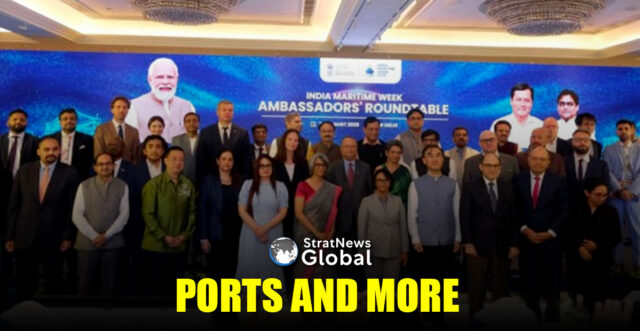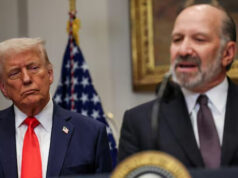India pitched a $1 trillion maritime investment roadmap at the Ambassadors’ Roundtable Meet in New Delhi on August 27, 2025, winning endorsement from envoys of 28 nations.
Hosted by the Ministry of Ports, Shipping and Waterways (MoPSW) and chaired by Union Minister Sarbananda Sonowal, the conclave brought together senior officials, industry leaders, and multilateral representatives ahead of India Maritime Week (IMW) 2025. The gathering underscored India’s ambitions to emerge as a global hub for ports, shipping, sustainable trade, and the blue economy.
Sonowal told participants that India’s maritime journey had entered a new chapter under Prime Minister Narendra Modi’s vision. He said transformative initiatives such as Maritime India Vision 2030 and Maritime Amrit Kaal Vision 2047 were reshaping the ports, shipping, and logistics ecosystem into one that is “resilient, sustainable and future-ready.”
The $1 trillion roadmap, he noted, opened opportunities for joint ventures in port and cargo terminal operations, multi-modal terminals, shipbuilding, ship recycling, ship repairs, green hydrogen hubs, and sustainable shipping solutions.
“Under the dynamic leadership of Hon’ble PM Narendra Modi ji, we are working to transform our ports, shipping, and logistics ecosystem into one that is resilient, sustainable, and future-ready, and this opens vast avenues for international collaboration,” Sonowal said.
India was opening its doors “from ports to green hydrogen hubs” for global partnerships, and IMW 2025 would be the platform where “ideas can translate into projects, and commitments into partnerships,” he underlined.
Minister of State for Ports, Shipping and Waterways Shantanu Thakur also addressed the conclave, underlining reforms in port modernisation, inland waterways expansion, and digitalisation.
Citing Prime Minister Modi’s assertion that “Ports are not just gateways of prosperity, but gateways of India’s future,” Thakur said India was modernising its maritime sector to make it a pillar of nation-building, technology adoption, and sustainable development. “Technology is at the heart of this progress—AI-driven logistics, digital port operations, and automation are making our ports more efficient and globally competitive,” he said, noting that global players were increasingly partnering with Indian counterparts in shipbuilding, smart logistics, and green shipping.
A sectoral presentation by R. Laxmanan, Joint Secretary, MoPSW, detailed opportunities in mega projects such as Vadhavan Port, Galathea Bay Transshipment Port, and Tuna Tekra Terminal. These large-scale ventures, he said, were complemented by potential investments in green hydrogen hubs, LNG bunkering, shipbuilding, ship recycling, and maritime industrial parks.
Discussions at the roundtable focused on India’s core maritime priorities, including strengthening shipbuilding capacity and port-led development as levers to establish the country as a global hub. Delegates underlined the potential of the blue economy, highlighting the need for sustainable use of ocean resources to generate livelihoods and long-term growth.
Digitalisation emerged as another central theme. Participants emphasised how improved efficiency, transparency, and cost reduction could be achieved through digitalised logistics, while accelerating the transition to green shipping was also stressed. Hydrogen-powered and low-emission vessels, in particular, were identified as essential to meeting future sustainability benchmarks. The role of IFSC-GIFT City in driving maritime financing was also highlighted as a critical enabler to attract global investment and foster innovation.
Envoys welcomed the government’s legislative reforms, which have modernised India’s maritime framework by replacing colonial-era laws with five new acts: the Bills of Lading Act, Carriage of Goods by Sea Act, Merchant Shipping Act, Coastal Shipping Act, and the Indian Ports Act. These reforms, they noted, aligned India’s legal framework with global best practices and offered clarity and stability for international investors.
The outcomes of the roundtable will feed into India Maritime Week 2025, scheduled for October 27–31 at the NESCO Exhibition Centre in Mumbai. Described by the ministry as its biennial flagship platform, the event will convene policymakers, investors, and thought leaders to shape the future of Indian ports and logistics. The 2025 edition will focus on infrastructure, people, and future-ready innovation as India seeks to project itself as a leader in sustainable maritime development.
Summing up the conclave, Sonowal said India stood ready to collaborate with global partners to build a maritime future that is “prosperous, sustainable and inclusive.” The broad endorsement of India’s investment roadmap by envoys from 28 nations, he added, demonstrated strong international interest in partnering with India’s maritime growth story.
In a career spanning three decades and counting, Ramananda (Ram to his friends) has been the foreign editor of The Telegraph, Outlook Magazine and the New Indian Express. He helped set up rediff.com’s editorial operations in San Jose and New York, helmed sify.com, and was the founder editor of India.com.
His work has featured in national and international publications like the Al Jazeera Centre for Studies, Global Times and Ashahi Shimbun. But his one constant over all these years, he says, has been the attempt to understand rising India’s place in the world.
He can rustle up a mean salad, his oil-less pepper chicken is to die for, and all it takes is some beer and rhythm and blues to rock his soul.
Talk to him about foreign and strategic affairs, media, South Asia, China, and of course India.





